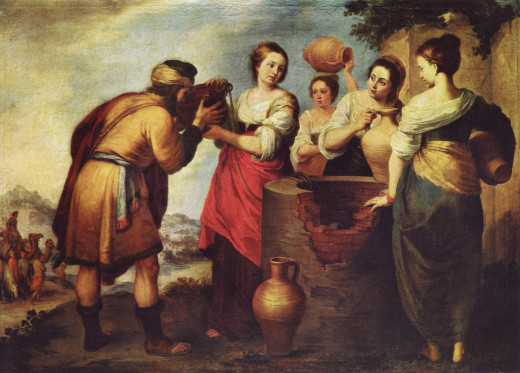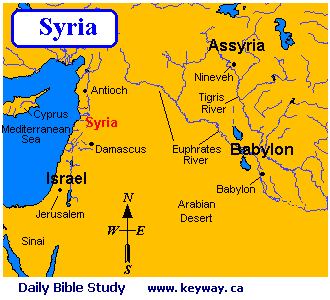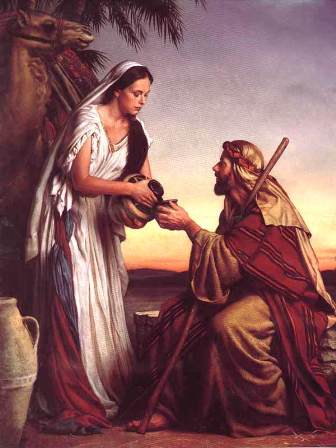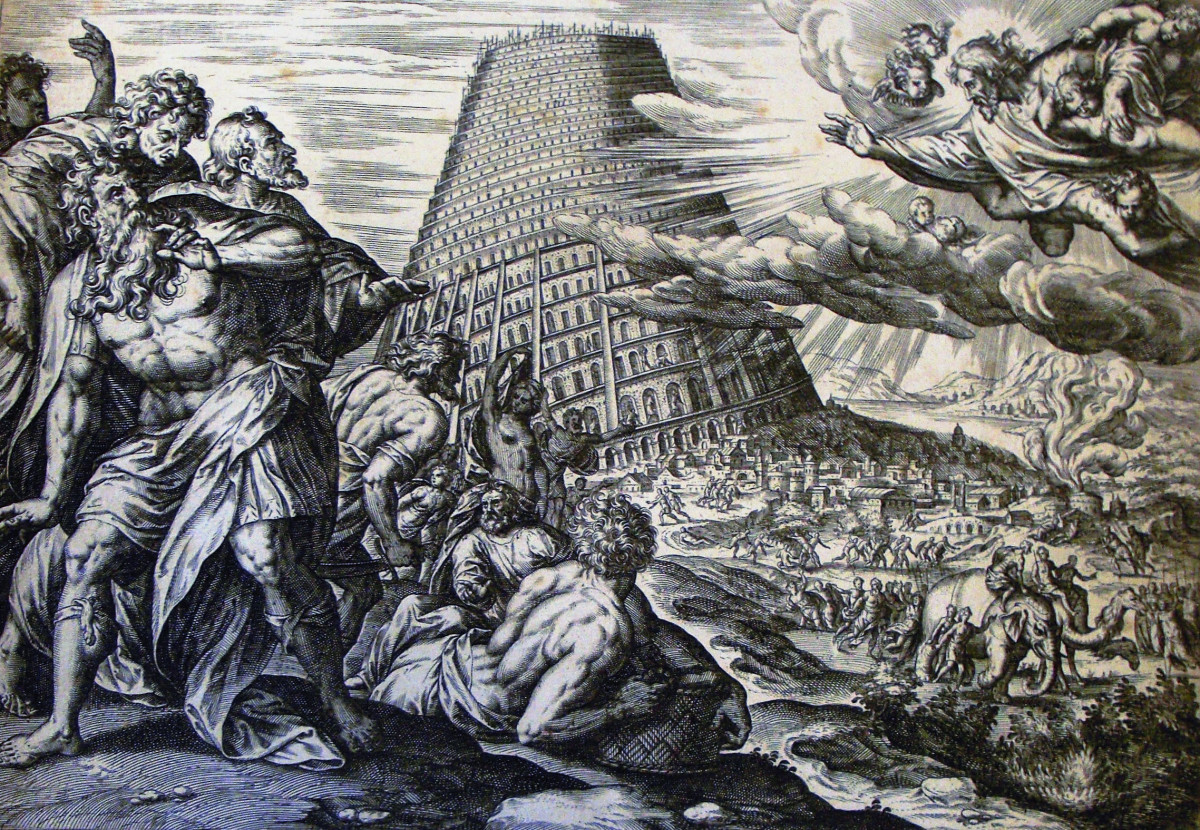Rebekah the Prophetess
Introduction: Rebekah's Destiny As Prophetess
After a detailed study of the article by Sharon Jeansonne on Rebekah, one can only conclude that Rebekah is portrayed as a prophetess. Of paramount importance is the delineation of Rebekah as God's destined one. Rebekah is a prophetess who appropriately takes the necessary action to support God's plans. Of secondary importance is the presentation of human law as sometimes contradictorry to Divine Will. The author is consistent and coherent in representing Rebekah as successfully fulfilling God's plan. The author's argument breaks down however, in her biased interpretation of the servant's actions while trying to find an appropriate wife for Isaac. The author presupposes that the servant may have contradicted Abraham's directions and thus misrepresented the Divine Will. Jeansonne questions the servant's words and actions. From my own perspective, I agree with the author that Rebekah is the one destined to be prophetess, and co-creator in the fulfillment of God's convenantal promise to the Israelites. In contrast, I differ with the author's biased view of the servant, as someone who possibly did not fulfill the commands of Abraham and the Will of God.
Rebekah

Rebekah as Prophetess
- Rebekah is portrayed as prophetess, one who hears and works in harmony with the Divine Will
- Rebekah ensures God's designated choice, Jacob, receives Isaac's blessing
- Rebekah must act in accordance with Divine Will and in opposition to existing laws of society in order to fulfill God's plan
- the struggle becomes God's Will versus human law
- the existing laws of society were purported to be a reflection of Divine Law
- however, God's Will for Jacob contradicts existing human law
- the eldest child, Esau, according to human law, should receive his father's blessing
- Jacob, the youngest twin, is the Divinely appointed inheritor of his father's blessing
- the existing human law, in this situation, contradicts God's Will
- Rebekah is the one, destined by God, to assist in the fulfillment of the Divine plan
Rebekah - Map

Rebekah as Independently Important
The portrait of Rebekah as a matriarch is developed in the striking way in which she is portrayed. Jeansonne describes Rebekah as being appreciated for more than her beauty:
"her independence and trust are demonstrated by her willingness to leave her family and
travel to a strange land ... she ensures that God's designated choice, Jacob, the second-
born, receives Isaac's blessing"
Rebekah is represented as a character in her own right. Few women in Biblical tradition are recognized as independently important. The structure of society during Rebeka's time, and the time the narrative was written, was extremely patriarchal.
Rebekah's distinctive character is significant. Firstly, she is portrayed as a beautiful, kind and generous woman. Rebekah is more than only beautiful, and she is not submissive like the majority of women in her time. Jeansonne describes Rebekah's character as:
"forthright in expressing her desires and feelings ... she inquires of God without hesitation,
and God speaks to her. She risks her husband's curse in obtaining the blessing for Jacob"
Rebekah must rise up against the system of primogeniture in order to fulfill God's Will. Rebekah knows from the birth oracle that Jacob is God's chosen. Rebekah must resort to trickery and deception of Isaac, because of her powerlessness in a patriarchal society. In the Bible, deception is typically used by marginalized and powerless character, such as Rebekah. Even after obtaining the blessing, Rebekah must carefully maneuver in order to save Jacob's life.
Rebekah
God Chose Rebekah
- God chose Rebekah, a person of intellingence, independence, and strength of character to fulfill the Divine plan.
- God chose Rebekah, a woman, powerless in her society, yet able to hear and appropriately act on God's word
- Rebekah does take action to successfully accomplish God's Will
- Rebekah's great strength of character is, perhaps, the reason why God chooses her as the destined one to help fulfill the convenantal promise of land, descendents and blessing to the future generations of the Israelites
- Rebekah takes action in accordance with God's Will and is successful in her accomplishments
Human Law in Contradiciton to Divine Will
Rebekah is viewed as the personification of harmonious action in accordance with God's Will. The societal laws must take on a secondary importance for this to be accomplished. Jeansonne describes Isaac further as:
"He allows his fears to overwhelm him. Rather than trusting in God's assurance, he
endangers both Rebekah and himself. In deep contrast, Isaac appears to consider only his own
welfare."
Isaac can be viewed as the personification of action unaware of and in disharmony with the Divine Will. Isaac may represent the established societal structure, only with no added dimension of interaction with the Divine. Ulimately, the Will of God becomes of primary importance in relation to the secondary importance of human law in the situation of Rebekah and Isaac.
Rebekah's Fulfillment of Divine Will
Jeansonne is consistent in the portrayal of Rebekah's fulfillment of the Divine Will. Of primary importance is Rebekah's role in assuring that Jacob receive the blessing from his father. Rebekah appropriately takes the necessary action to support God's plans. Human law is presented as secondary in importance, and at times contradictory to the Divine Will. Jeansonne consistntly represents the Divine Will as central to the Biblical text of Tebekah, and as successfully fulfilled. Personally, I feel that the Biblical story of Rebekah is a perfect representation of the workings of the Divine Will.
Reference
1. "Holy Bible New Revised Standard Version" 1997, Oxford University Press, New York, U.S.A.
2. "The Women of Genesis" 1990, Sharon Jeansonne, Fortress Press, Minneapolis, Minnesota,
U.S.A.
Rebekah at the Well - Francesco Solimena - Drawings

Poll
Who is your favourite female person from the Bible stories?
© 2014 Deborah Morrison








